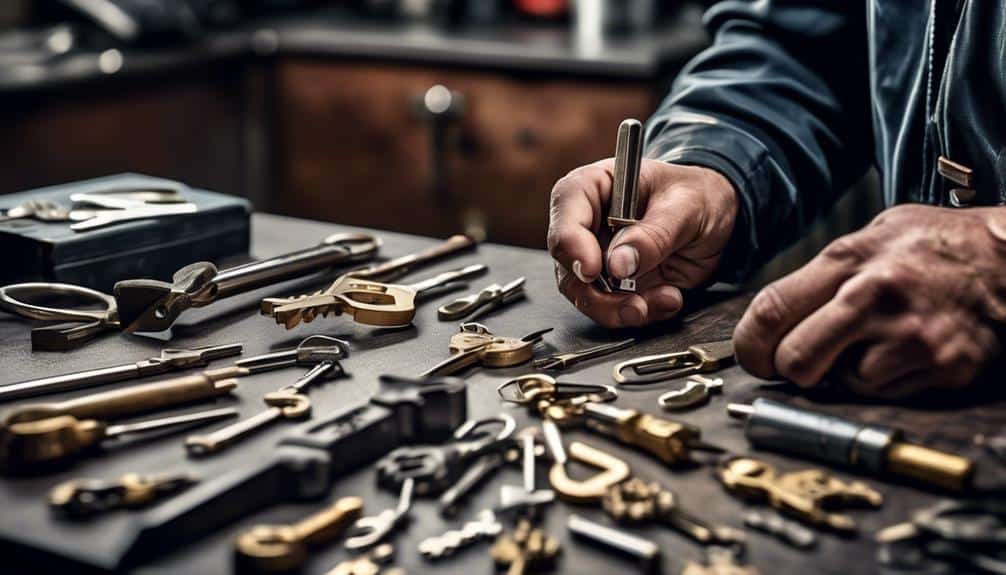Have you ever wondered how residential keys are duplicated? Well, let me tell you, the process is not as simple as it may seem.
Duplicating residential keys involves a series of precise steps and requires specific tools. In this discussion, we will explore the fascinating process of key duplication, from the types of locks that can be duplicated to the common mistakes to avoid.
So, if you're curious to uncover the secrets behind duplicating residential keys, you're in for a treat.
Reasons for Residential Key Duplication
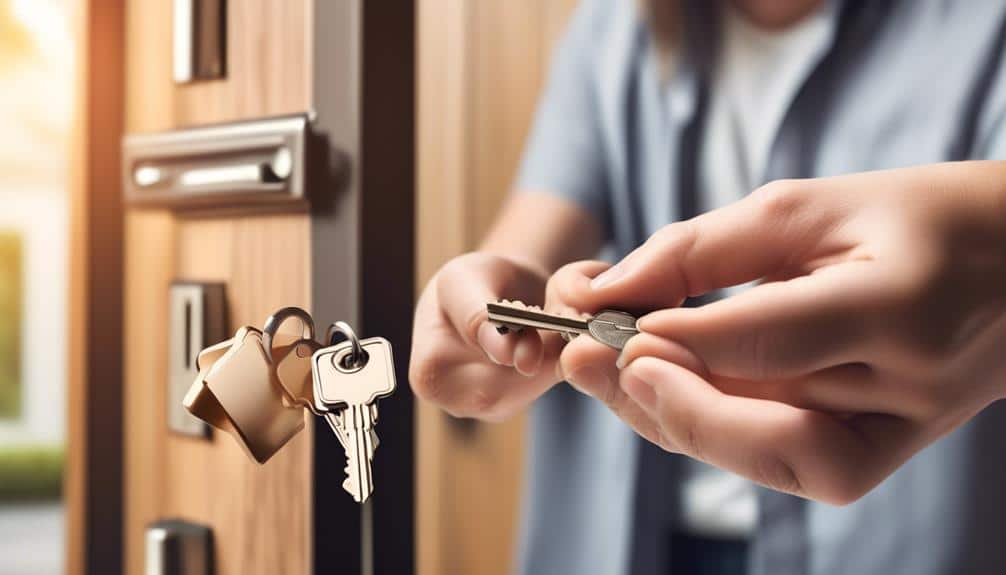
There are several reasons why residential keys may need to be duplicated. Residential key duplication offers numerous benefits and plays a vital role in maintaining the security of a property. One of the primary reasons for key duplication is to provide multiple copies of keys to family members or trusted individuals. This ensures that everyone who needs access to the property can have their own key, minimizing the risk of lost or misplaced keys.
Key duplication also serves as a convenient solution for homeowners who frequently have guests or tenants, allowing them to provide temporary access without compromising the security of the property.
Another important reason for residential key duplication is the need for backup keys. Having extra copies of keys can be a lifesaver in situations where keys are lost, stolen, or damaged. It provides a quick and cost-effective solution, eliminating the need for expensive lock replacements or emergency locksmith services.
Moreover, key duplication is essential for property management purposes. Landlords, property managers, and real estate agents often require duplicate keys to efficiently manage and show properties to potential tenants or buyers. This saves time and ensures the smooth operation of rental or sales processes.
Types of Residential Locks for Key Duplication
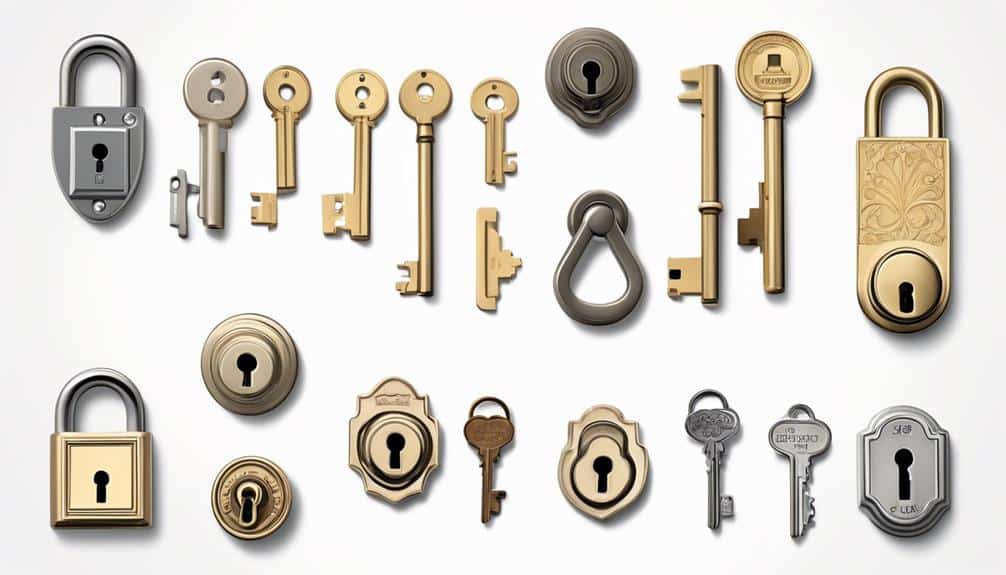
When it comes to duplicating residential keys, it's important to understand the different types of locks that are commonly used.
There are various residential lock brands available in the market, each with its own unique features and key duplication techniques.
One popular type of lock is the pin tumbler lock, which is commonly found in residential homes. This type of lock uses a series of pins of varying lengths to prevent the lock from opening without the correct key. Key duplication for pin tumbler locks typically involves creating a copy of the original key by matching the cuts on the key blade.
Another type of lock commonly used in residential settings is the wafer lock. These locks use flat wafers instead of pins to prevent unauthorized access. Key duplication for wafer locks involves creating a copy of the original key by matching the positions and depths of the wafers.
Understanding the different types of residential locks and their key duplication techniques is essential for locksmiths and anyone involved in the key duplication process.
Tools Required for Duplicating Residential Keys
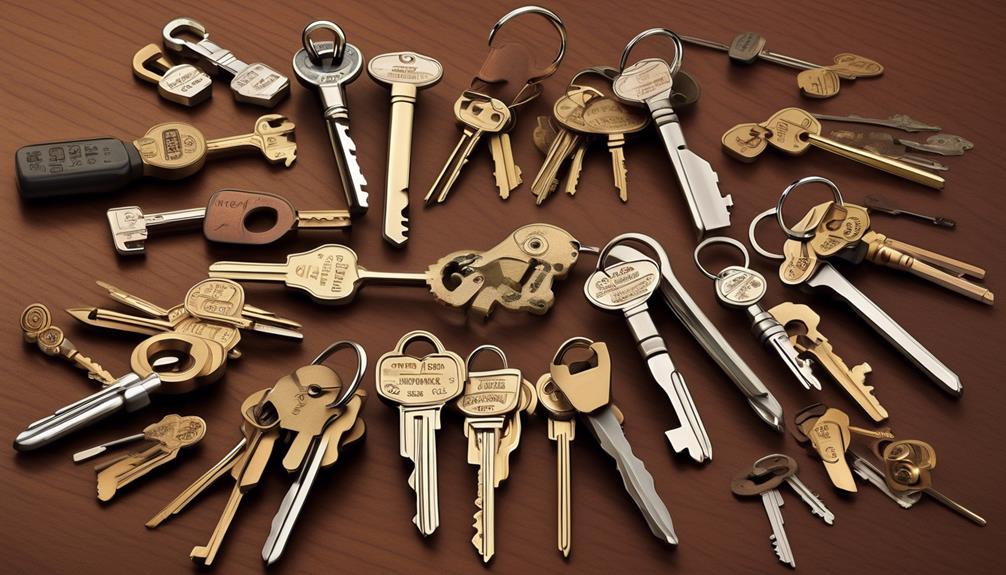
Now let's explore the tools necessary for duplicating residential keys. When it comes to key duplication, precision is of utmost importance. Having the right tools and techniques ensures that the duplicate key will function properly and fit seamlessly into the lock.
Below is a table showcasing the essential tools for key duplication:
| Tool | Description |
|---|---|
| Key Cutting Machine | A specialized machine used to cut the duplicate key accurately. It is equipped with various cutting blades to match different key types. |
| Key Blanks | Blank keys that serve as the base for creating the duplicate. They come in different shapes and sizes to fit various locks. |
| Calipers | Used to measure the original key's dimensions precisely. This helps in replicating the key's unique shape and size. |
| Key Duplicator | A handheld device that traces the original key's shape and transfers it to the blank key. It ensures the duplicate key matches the original perfectly. |
| Key Gauge | A tool used to determine the depth and spacing of the key's cuts. It ensures the duplicate key will properly engage the lock pins. |
Using these tools and techniques, locksmiths and key duplicators can create accurate duplicates for residential keys. Remember, precision is vital to ensure the functionality and security of the duplicated key.
Step-by-Step Guide to Duplicating Residential Keys
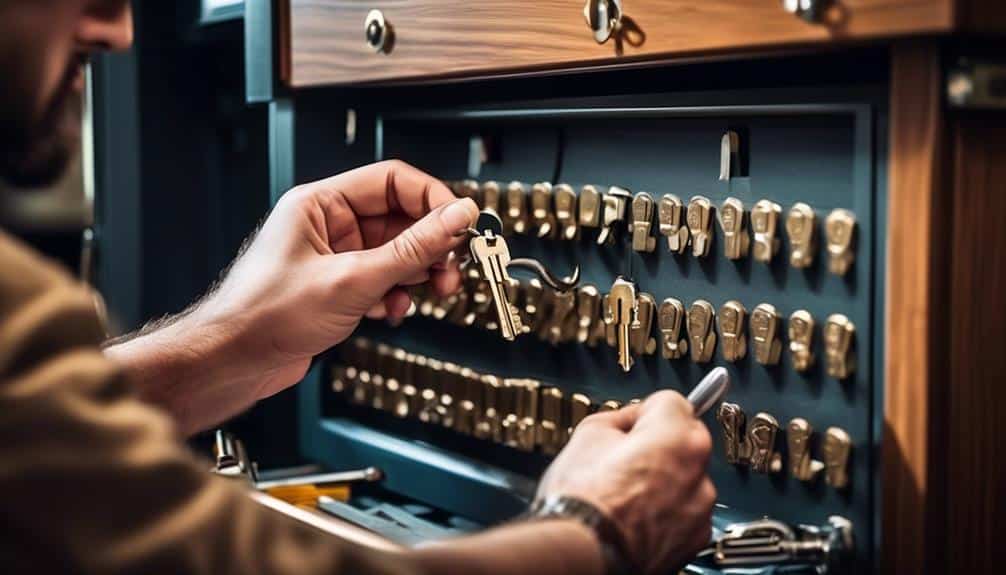
To duplicate a residential key accurately and efficiently, follow this step-by-step guide.
Key copying is a common practice done for various reasons, such as providing spare keys to family members, roommates, or trusted neighbors. Accurate key duplication is essential to ensure that the copied key functions properly and can be used seamlessly in the lock.
First, gather all the necessary tools and materials, including the original key, a blank key, a key cutting machine, and any additional accessories like key gauges or calipers.
Next, inspect the original key for any signs of wear or damage that may affect the copying process. Clean the key if necessary to ensure accurate measurements.
Then, carefully place the original key into the key cutting machine and align it properly. Use the machine to trace the profile of the original key onto the blank key.
Once the tracing is complete, remove the original key and insert the blank key into the machine. Cut the blank key based on the traced profile, ensuring that the machine accurately duplicates all grooves and notches.
Finally, remove the duplicated key from the machine and test it in the corresponding lock. Check for smooth operation and ensure that the key fully engages with the lock mechanism.
Accurate key duplication is crucial to ensure that the duplicated key functions properly and provides the desired level of security. Following this step-by-step guide will help you duplicate residential keys accurately and efficiently.
Common Mistakes to Avoid in Key Duplication
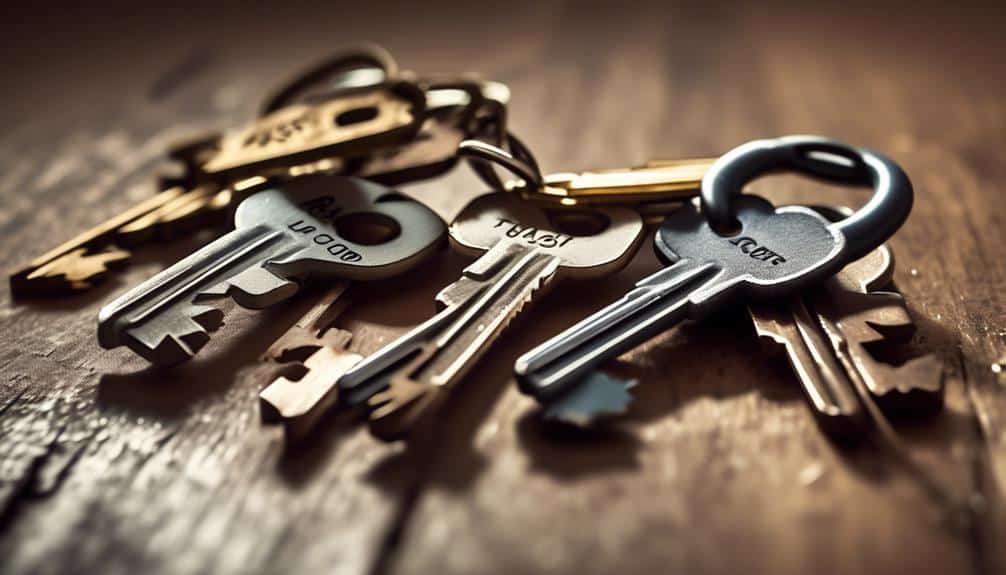
When it comes to duplicating residential keys, there are certain common mistakes that should be avoided. These mistakes can lead to faulty duplicates that may not work properly or even damage the original key.
To ensure a successful duplication process, it's important to be aware of these key duplication mistakes and follow some helpful tips for accurate and reliable results.
Key Duplication Process
Common mistakes can be easily avoided during the key duplication process by following a few simple guidelines. It is important to employ proper key duplication techniques and take necessary safety measures to ensure accurate and secure duplication. Here are some common mistakes to avoid:
| Mistake | Solution |
|---|---|
| Using worn-out keys | Always use a clean, well-maintained key as the master to ensure accurate duplication. |
| Ignoring manufacturer specifications | Follow the guidelines provided by the key manufacturer to ensure proper duplication. |
| Skipping quality checks | Always inspect the duplicate key for any imperfections or inaccuracies before use. |
Key Duplication Mistakes
After ensuring the proper key duplication techniques and safety measures are in place, it's crucial to be aware of and avoid common mistakes that can occur during the key duplication process.
Key duplication errors can have serious consequences, such as rendering the duplicate key ineffective or causing damage to the original key. One common mistake is using a worn-out key as the master key for duplication. This can result in an inaccurate copy with a poor fit.
Another mistake is failing to properly align the key in the duplicating machine, leading to a key that doesn't work in the lock. Additionally, using incorrect key blanks or not using the proper cutting technique can also result in faulty duplicates.
Tips for Successful Duplication
To ensure successful key duplication, it's important to avoid common mistakes that can lead to faulty duplicates or damage to the original key. Here are some tips to help you achieve accurate and reliable results when using key duplication services:
- Choose a reputable and experienced key duplication service provider to ensure quality workmanship.
- Provide the original key to the service provider rather than a duplicate, as duplicates may have subtle differences that can affect the accuracy of the new key.
- Communicate any specific requirements or preferences for the duplicate key, such as the type of key blank or any additional features needed.
Key Duplication Services for Residential Properties
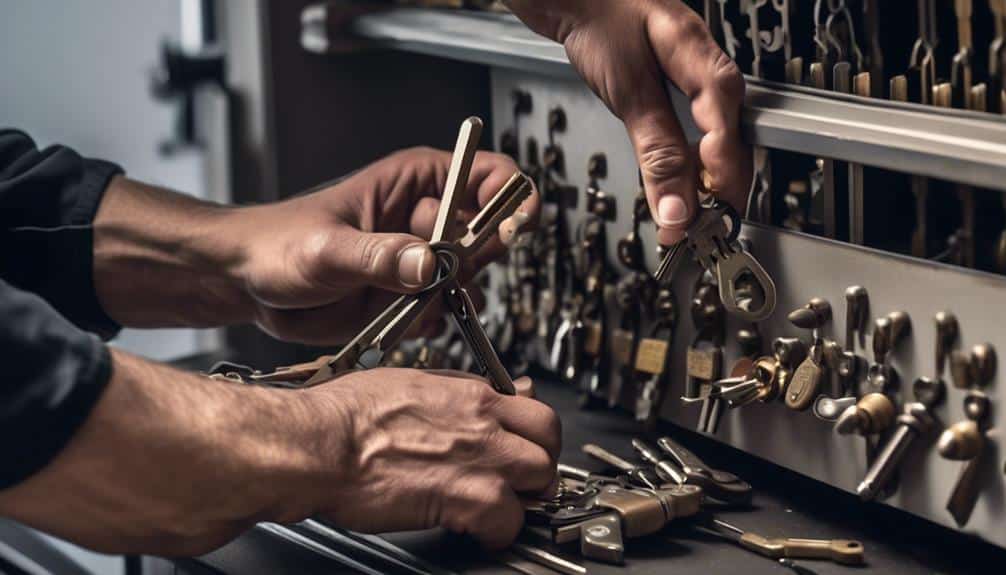
We offer efficient and reliable key duplication services for residential properties. There are several reasons why homeowners may need to duplicate their keys. For instance, they may want to provide a spare key for family members or trusted friends, or they may need to replace lost or stolen keys. Regardless of the reason, there are several benefits to using professional key duplication services.
Firstly, professional key duplication ensures accuracy and precision. Experienced locksmiths have the necessary tools and expertise to accurately duplicate keys, ensuring that the new key functions smoothly and fits perfectly into the lock. This eliminates the frustration of trying to use poorly duplicated keys that may not work properly.
Secondly, professional duplication services offer convenience. Instead of attempting to duplicate keys themselves, homeowners can simply bring their keys to a professional locksmith and have duplicates made in a timely manner. This saves time and effort, especially for individuals who may not have the necessary tools or skills to duplicate keys effectively.
Factors to Consider When Choosing a Key Duplication Service
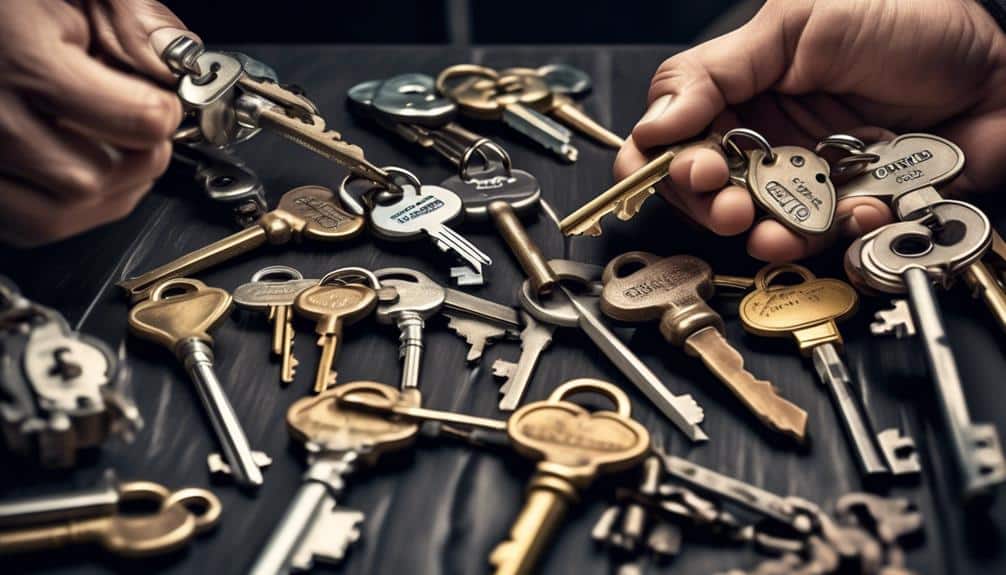
When selecting a key duplication service, it's crucial to consider several factors that will ensure the best outcome for your residential property. Here are some key factors to keep in mind:
- Quality of Service: Look for a key duplication service that has a reputation for providing high-quality duplicates. This will ensure that the keys are durable and function properly.
- Security Measures: It's important to choose a service that takes security seriously. Make sure they've strict protocols in place to protect your keys and prevent unauthorized duplication.
- Turnaround Time: Consider the time it takes for the key duplication service to complete the process. If you need the duplicates urgently, look for a service that offers quick turnaround times.
Benefits of Professional Key Duplication for Residential Locks
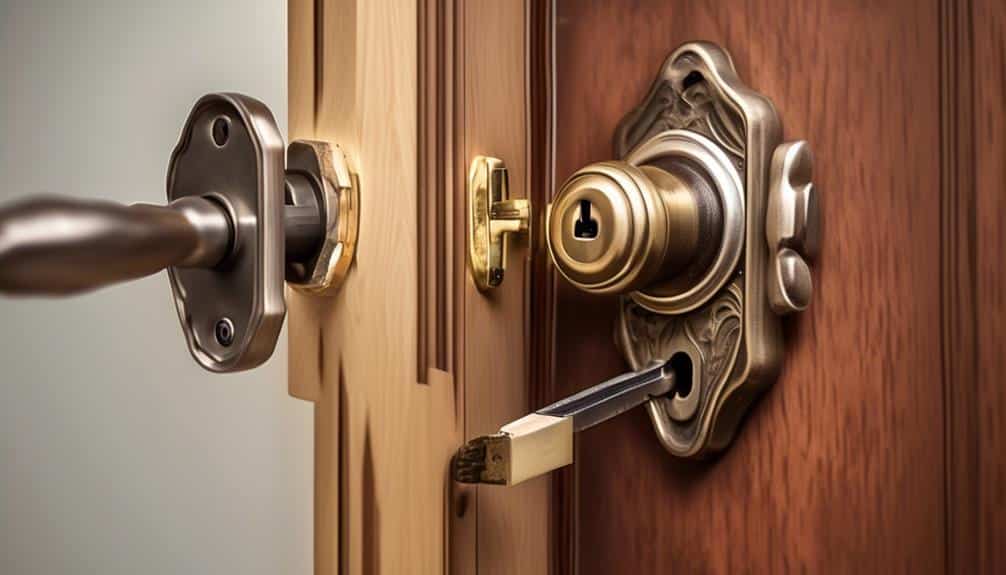
Considering the factors mentioned earlier, professional key duplication for residential locks offers a range of benefits that ensure the utmost security and convenience for homeowners.
One of the main advantages of professional key duplication is the assurance of accuracy and precision. Professional locksmiths have the expertise and specialized tools to create accurate duplicates, minimizing the risk of errors that could lead to lockouts or malfunctions.
Another benefit is the availability of high-quality materials. Professional key duplication services often use premium materials that are durable and resistant to wear and tear. This ensures that the duplicate keys will function smoothly and last for a long time, providing peace of mind to homeowners.
Professional key duplication also offers the advantage of convenience. With their advanced equipment and efficient techniques, locksmiths can quickly duplicate keys, saving homeowners time and effort. Additionally, professional locksmiths can often provide on-site services, eliminating the need for homeowners to travel to a locksmith shop.
Furthermore, professional key duplication services often come with additional security measures. Locksmiths can provide expert advice on enhancing the security of residential locks, such as recommending high-security locks or implementing key control systems. These added security measures can significantly improve the overall security of a home.
Tips for Maintaining Duplicate Residential Keys
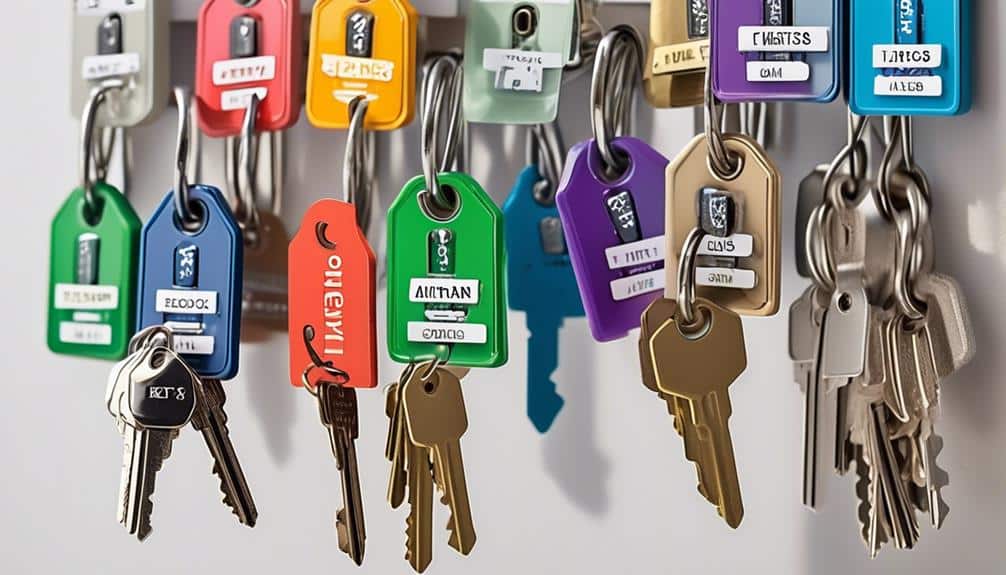
Now that we've successfully duplicated our residential keys, it's important to maintain them properly to ensure their longevity and functionality.
There are a few key maintenance tips that we should keep in mind. By regularly cleaning and lubricating our duplicate keys, we can prevent them from getting stuck or corroded.
Additionally, it's crucial to store our duplicate keys in a safe and secure location to avoid misplacement or unauthorized access.
Key Duplication Process
To maintain duplicate residential keys, it's advisable to regularly inspect and maintain their quality and functionality. Here are some tips to help you maintain your duplicate keys:
- Keep them clean and free from dirt and debris.
- Lubricate the keys with graphite or silicone-based lubricant to prevent them from sticking or jamming.
- Check for any signs of wear or damage, such as bent or chipped edges, and replace them if necessary.
Regular maintenance of duplicate keys is important for several reasons. Firstly, it ensures that they'll work properly when you need them.
Secondly, it can help prevent any potential issues or emergencies that may arise from using a faulty key.
Lastly, maintaining your duplicate keys can save you money in the long run by avoiding the need for costly repairs or replacements.
Key Maintenance Tips
Maintaining the quality and functionality of your duplicate residential keys is crucial, and here are some key maintenance tips to help ensure their effectiveness and reliability.
| Key Maintenance Tips | Benefits |
|---|---|
| Keep keys clean and dry | Prevents rust and damage |
| Avoid excessive force | Prevents bending or breaking |
| Lubricate keys regularly | Ensures smooth operation |
| Store keys separately | Reduces risk of loss or theft |
To maintain the integrity of your duplicate keys, it is important to follow these key maintenance tips. Keeping your keys clean and dry helps prevent rust and damage, ensuring their longevity. Avoiding excessive force when using the keys reduces the risk of bending or breaking. Regularly lubricating the keys ensures smooth operation and minimizes friction. Lastly, storing your keys separately decreases the likelihood of loss or theft. By following these key maintenance techniques, you can ensure that your duplicate residential keys remain in optimal condition, providing you with reliable access to your home.
Frequently Asked Questions
Can I Duplicate My Residential Key Using a Regular Key-Cutting Machine at Home?
Yes, we can duplicate residential keys using a regular key-cutting machine at home. However, there are pros and cons to consider.
DIY key duplication at home is convenient and cost-effective, but it may not always produce accurate duplicates. A locksmith, on the other hand, has specialized equipment and expertise to ensure precise and high-quality duplication.
It ultimately depends on your preference and the level of accuracy you require for your residential keys.
What Is the Average Cost for Duplicating a Residential Key?
On average, the cost of duplicating a residential key can vary depending on several factors.
Factors that affect the cost include the type of key, the complexity of the key design, and the location where the duplication is done.
It's important to consider these factors when estimating the average cost.
Can a Locksmith Make a Duplicate Key From a Broken or Damaged Key?
Yes, a locksmith can make a duplicate key from a broken or damaged key. We've the expertise to carefully examine the broken key and create a new one based on its design.
Our key duplication process for high security residential keys involves using specialized equipment to ensure precision and accuracy.
Additionally, we offer key duplication options for specialty or antique residential keys, taking extra care to preserve their unique characteristics.
Rest assured, we've the solutions to meet your key duplication needs.
Is It Possible to Duplicate a Key if I Only Have a Photograph of It?
Key duplication services online can make duplicates from photographs, but there are risks and concerns involved. Without the context of the process for duplicating residential keys, it's important to note that relying solely on a photograph may not guarantee an accurate duplicate.
Factors such as the angle, lighting, and quality of the photograph can affect the accuracy. Additionally, security concerns arise as someone could potentially use a photograph to create unauthorized duplicates.
Are There Any Restrictions or Legal Requirements for Duplicating Residential Keys?
When it comes to duplicating residential keys, it's important to be aware of any legal requirements and key duplication restrictions that may be in place. These regulations vary from state to state and may involve factors such as proof of ownership, written consent, or identification verification.
Understanding and adhering to these legal requirements ensures that the key duplication process is carried out in a lawful manner. It's always recommended to consult with a professional locksmith who can provide guidance and assistance in navigating these regulations.

